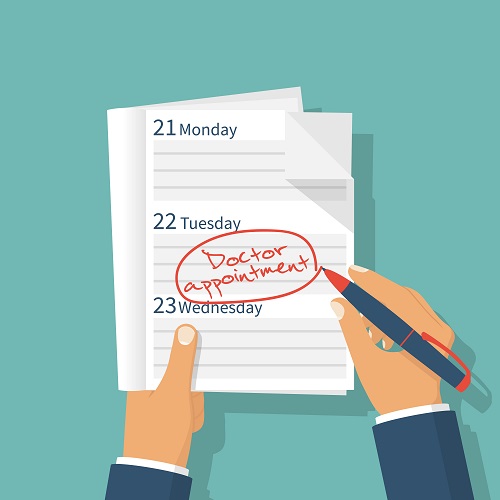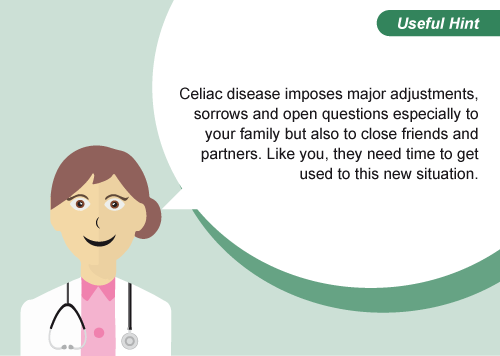Lesson 1: Coping with the Diagnosis
1.3 How is family life affected by celiac disease?
The effects of celiac disease on the whole family should not be neglected. Different aspects of the daily family life are affected:
Daily life routines
Upon diagnosis, some essential decisions have to be taken: should the whole household be gluten-free? Are only main meals prepared gluten-free or are there always going to be different dishes and designated gluten-free equipment and areas in the kitchen? All families have to figure out for themselves what is feasible within their routines and if everybody is willing to accept the decision that is made. In any case, the gluten-free diet comes with increased domestic work: different foods have to be bought (maybe even in different shops further away from home) and everybody at home has to be very careful in the kitchen (cleaning up carefully, using the right equipment, etc.). Some families perceive that their freedom to depart on trips to other countries or even to go to restaurants is impeded. As many of the decisions are based on considerations whether or not gluten-free options will be available, for the unaffected family members it feels as if the affected one has the power over many of the decisions in the family. This can be a source of conflicts, stress and even frustration.
In any case, the gluten-free diet comes with increased domestic work: different foods have to be bought (maybe even in different shops further away from home) and everybody at home has to be very careful in the kitchen (cleaning up carefully, using the right equipment, etc.). Some families perceive that their freedom to depart on trips to other countries or even to go to restaurants is impeded. As many of the decisions are based on considerations whether or not gluten-free options will be available, for the unaffected family members it feels as if the affected one has the power over many of the decisions in the family. This can be a source of conflicts, stress and even frustration.
Practical tips to keep in mind
Yes, it requires more effort to run the household, but it will become easier and less demanding over time! The initiation and the establishment of new habits is the most difficult part.
To learn how to follow the gluten-free diet, all family members must be involved in the decision-making and everyone has to know the most important rules. This makes everybody feel as an equally important family member and supports the transition into adulthood.
Scheduling time or activities for the non-celiac children for foods that are otherwise not allowed inside the house can reduce their feeling that the affected sibling has the power over all decisions.
Talk frankly within the family when something is bothering a family member and find a solution together.
If celiac disease and the gluten-free diet impede family life long after diagnosis, families should consider asking for professional help, for example from psychologists or educated trainers from the celiac disease society.
Social life
Since eating is the basis of many of our social activities, celiac disease sometimes hampers people in going to these events. This may change the relationships with others. Especially spontaneous events may be complicated to handle; therefore, many invitations are turned down. When one family member avoids social interactions, this often affects the other family members as well.Practical tips to keep in mind
Be prepared and bring your own gluten-free food. It is a win-win situation: you don’t have to fear gluten ingestion and the host/chef doesn’t have to worry about contaminating your food and doesn’t have to prepare foods he or she doesn’t know well.
Tell others about celiac disease and explain to them what it is. The best way to do it will be addressed in the next chapter.
Disease-related worries
 Particularly when the affected family member is a child, there are many concerns the parents have to handle. First of all, they might deal with a bad conscience and a feeling of not having done everything they could if the diagnosis was delayed while symptoms already persisted. They are worried that their child will develop comorbidities and that their other children might develop celiac disease. Moreover, parents are most of the time in charge of what their child eats and therefore dietary adherence is in the parents’ hands. Harming their child accidentally is also one of the concerns some parents have. All of these feelings might lead to overprotection of the affected child. This however can pose a burden on the child and may provoke jealousy issues among siblings.
Particularly when the affected family member is a child, there are many concerns the parents have to handle. First of all, they might deal with a bad conscience and a feeling of not having done everything they could if the diagnosis was delayed while symptoms already persisted. They are worried that their child will develop comorbidities and that their other children might develop celiac disease. Moreover, parents are most of the time in charge of what their child eats and therefore dietary adherence is in the parents’ hands. Harming their child accidentally is also one of the concerns some parents have. All of these feelings might lead to overprotection of the affected child. This however can pose a burden on the child and may provoke jealousy issues among siblings.
Practical tips to keep in mind
It is never the parents’ fault if a child gets celiac disease. With the current knowledge from science, we know that there is nothing you can do to prevent it.
If the diagnosis is delayed, this is of course very unfortunate but this is not the parents’ fault! The good thing is that celiac disease has been diagnosed eventually, which means that it can finally be treated.
Comorbidities or long-term health consequences may occur. The best way to control it is to strictly adhere to the gluten-free diet (Unit 3, lesson 1), to make healthy food choices (Unit 3, lesson 3) and to go to regular medical check-ups (Unit 4, lesson 3).

